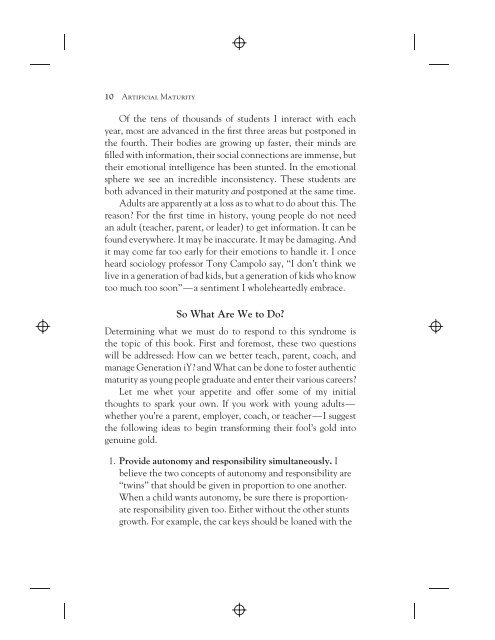maturity
Download a FREE sample chapter - Growing Leaders
Download a FREE sample chapter - Growing Leaders
- No tags were found...
Create successful ePaper yourself
Turn your PDF publications into a flip-book with our unique Google optimized e-Paper software.
10 Artificial Maturity<br />
Of the tens of thousands of students I interact with each<br />
year, most are advanced in the first three areas but postponed in<br />
the fourth. Their bodies are growing up faster, their minds are<br />
filled with information, their social connections are immense, but<br />
their emotional intelligence has been stunted. In the emotional<br />
sphere we see an incredible inconsistency. These students are<br />
both advanced in their <strong>maturity</strong> and postponed at the same time.<br />
Adults are apparently at a loss as to what to do about this. The<br />
reason? For the first time in history, young people do not need<br />
an adult (teacher, parent, or leader) to get information. It can be<br />
found everywhere. It may be inaccurate. It may be damaging. And<br />
it may come far too early for their emotions to handle it. I once<br />
heard sociology professor Tony Campolo say, ‘‘I don’t think we<br />
live in a generation of bad kids, but a generation of kids who know<br />
too much too soon’’—a sentiment I wholeheartedly embrace.<br />
So What Are We to Do?<br />
Determining what we must do to respond to this syndrome is<br />
the topic of this book. First and foremost, these two questions<br />
will be addressed: How can we better teach, parent, coach, and<br />
manage Generation iY? and What can be done to foster authentic<br />
<strong>maturity</strong> as young people graduate and enter their various careers?<br />
Let me whet your appetite and offer some of my initial<br />
thoughts to spark your own. If you work with young adults—<br />
whether you’re a parent, employer, coach, or teacher—I suggest<br />
the following ideas to begin transforming their fool’s gold into<br />
genuine gold.<br />
1. Provide autonomy and responsibility simultaneously. I<br />
believe the two concepts of autonomy and responsibility are<br />
‘‘twins’’ that should be given in proportion to one another.<br />
When a child wants autonomy, be sure there is proportionate<br />
responsibility given too. Either without the other stunts<br />
growth. For example, the car keys should be loaned with the


